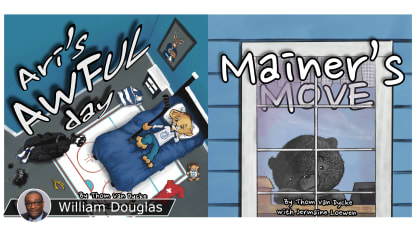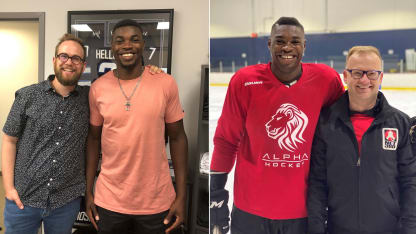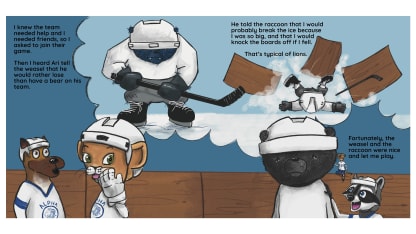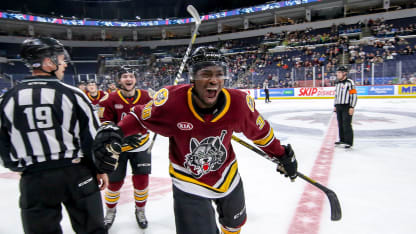In the book, Mainer encounters Ari, a prideful young lion packed with preconceived notions about the bear who joins his hockey team of other animals. Petkau calls Ari "a little brat you feel like smacking" early in the book.
"I'm pretty sure not ALL bears are bad news, but I could tell this kid was bad," Ari said in the book. "He was big and hairy and downright scary looking."
Loewen was one of the feel-good stories of the 2018 draft. He lived in an orphanage in Mandeville, Jamaica, until he was adopted by a white couple in Arborg, Manitoba, when he was 5 years old. Loewen put on his first pair of skates at age 6 -- late by Canadian standards -- and didn't play organized hockey until he was 10.
However, he progressed enough that Kamloops of the Western Hockey League, drafted him six years later. Loewen established himself as leader on the score sheet and in the locker room.
The 6-foot-4, 220-pound forward led Kamloops in scoring in 2017-18 with 64 points (36 goals, 28 assists) in 66 games and became team captain the following season. Loewen finished his WHL career with 142 points (78 goals, 64 assists) in 295 games.
He said he faced his share of discrimination on and off the ice while growing up.
"It wasn't straight blunt, but it's a pretty glaring thing that happens a lot to Black hockey players and other minorities," he said. "Those things sometimes wear on you but, really, it's about knowing who you are and it took me a long time and I'm still on that journey of knowing who I am as a hockey player and as a brother."
Loewen said it wasn't easy sharing some of his experiences for the book, but that he felt it was important to do it to help people get a grip on racism.
"It's definitely not easy to put yourself out there and share those things," he said. "But I think in this world, if you live something like that and don't put it out there then you're wasting some of your potential as a human being. I'm at the place, maturity-wise, that I can handle it. Putting yourself out there can put yourself in vulnerable positions. But it's also a good thing because it shows a lot of strength. People are opening up about what they've gone through and that creates a lot of healing for young kids."





















